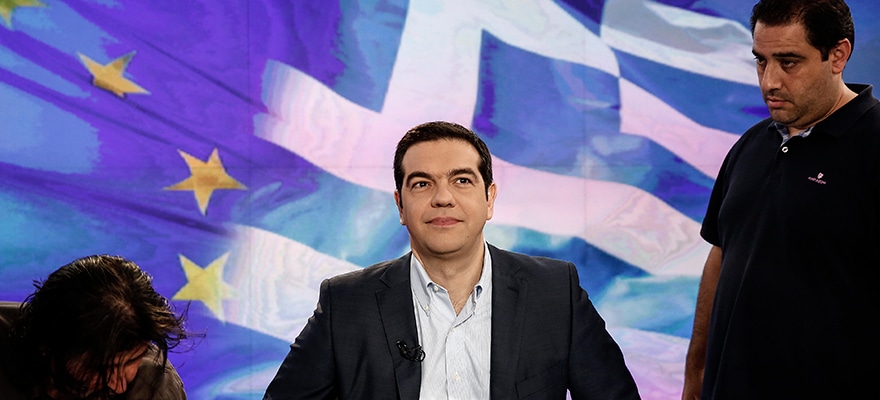June 30, 2015 looks to go down in history as (D)efault-Day in Greece, potentially marking the day it defected its payments and loans to the International Monetary Fund (IMF). Today’s passage will also cast doubt on an expiring European bailout package and its future in the Eurozone, despite the ardent refusal by some European creditors of a Grexit.
How Did We Get Here?
Despite months of negotiations that have seen optimism ebb and flow between Eurogroup creditors and Greek leaders, namely Prime Minister Alexis Tsipras and Finance Minister Yanis Varoufakis, the day has finally arrived where default transcends possibility and becomes reality.
The infamous figure in question and oft-cited €1.6 billion (1.79$ billion) payment to the IMF is due by midnight tonight, which looks to be untenable given the cash-strapped state of the Greek economy.
Earlier this week, Greece’s Central Bank imposed capital controls to effectively slow the capital exodus from the country that has been hemorrhaging euros over the past few months.
The situation reached a critical stage late Friday night when , resulting in crowds of Greeks lining up to withdraw their money before banks closed. The Greek Central Bank has since released a statement guaranteeing deposits, despite an ongoing bank holiday that will last until at least the referendum – until then Greeks will be relegated to a daily ATM cash ration of €60 ($67).
During the negotiations, relations have trended generally downward, with repeated bouts of frustration and exhaustion on both the part of Eurogroup and Greek leaders. In particular, Mr. Tsipras has lashed out at the IMF repeatedly, criticizing it as a ‘criminal organization’, however the Greek PM has also accused the Eurogroup of blackmail while labeling fellow peripheral countries, Portugal and Spain as the ‘Axis Powers’ back in February.
We have justice on our side. If we can overcome fear, then there is nothing left to fear.
— Alexis Tsipras (@tsipras_eu)
The impasse between Greek leaders and Eurogroup creditors remains unfathomably large, with each bunkering down for the July 5 referendum aftermath. For many, lost in the shuffle and consequent damage control is the IMF payment, which at €1.6 billion, measures just a fraction of Greece’s overall €220 billion ($246 billion) owed to creditors and bondholders. After Greece already bundled its payments earlier this month to the IMF and with time officially out, a default at midnight seems all but certain, joining the likes of Argentina in the annuls of history.
What Happens Next?
Greece has already bundled four packages this past month, and still is on the hook for €9.7 billion ($10.83 billion) to the IMF in 2015. Assuming midnight passes in Greece with no deal struck, the country will officially enter into formal default, triggering a number of potential scenarios.
First, the IMF could afford Greece a thirty-day grace period during which the country can stabilize and collect itself in the aftermath of its July 5 referendum. However, as recently as last week, IMF Managing Director Christine Lagarde deflected any possibility of an extension, following a breakdown of negotiations. That being said, desperate times call for desperate measures and the possibility of an extension cannot yet be ruled out.
In addition to the IMF, Greece’s laundry list of loans are also slated to pile up in July and August, namely to the European Central Bank (ECB) to the tune of €6.66 billion ($7.4 billion). As for the intangible repercussions of a Greek default, the greatest headwinds could emanate from the Eurogroup itself, who will be venturing into unchartered waters after the current bailout package expiry today, should no deal be struck.
Regardless, neither side would likely blink before the July 5 referendum that might see a Greek return into Europe’s embrace – alternatively, a ‘no’ vote and rejection of current bailout conditions could potentially plunge Europe into a maelstrom of uncertainty, notwithstanding the immolation of Greece.
Making matters worse is the current language of the terms in the existing Greek bailout program, which state that a default to the IMF would automatically constitute a default on its European rescue loans as well. Theoretically, the European Financial Stability Facility (EFSF) could also rescind its support and declare the principal amount of the loan to be due immediately, though this drastic measure seems unlikely, especially given the turbulent state of affairs in Greece.
Not the End of the Line
A Greek default of this month’s IMF’s loan package would also unlikely spell the end of relations between the embattled country and the lender – for example, despite defaulting in 2001, Argentina managed to pay back the entirety of its $100 billion loan the IMF in less than five years. Of course, given the present delicacy of the situation between Greece, the IMF, and the Eurogroup, any timetable or future commitments appear murky at best, exacerbated by a deteriorating confidence amongst international investors.
At the time of writing, Greek 2-year bond yields have soared to 37.23%, while the EUR/USD has relinquished the 1.12 handle, trading at 1.1189 during European trading.





Be First to Comment